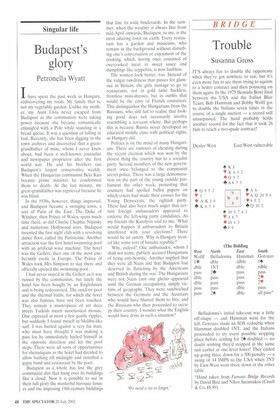Budapest's glory
Petronella Wyatt
Ihave spent the past week in Hungary, rediscovering my roots. My family that is, not my vegetable garden. Unlike my mother, my Aunt Livia never escaped from Budapest as the communists were taking power because she became romantically entangled with a Pole while standing in a bread queue. It was a question of falling in loaf. Recently, she has been digging in the town archives and discovered that a greatgrandfather of mine, whom I never knew about, had been a well-known journalist and newspaper proprietor after the first world war. He and his brothers ran Budapest's largest conservative weekly. When the Hungarian communist Bela Kun became prime minister he condemned them to death. At the last minute, my great-grandfather was reprieved because he was blind.
In the 1930s, however, things improved, and Budapest became a swinging town, a sort of Paris of the East. The Duke of Windsor, then Prince of Wales, spent much time there, as did Charlie Chaplin, Nijinsky and numerous Hollywood stars. Budapest invented the first night club with a revolving dance floor, called the Parisienne. Another attraction was the first hotel swimming-pool with an artificial wave machine. The hotel was the Gellert, then one of the most exuberantly exotic in Europe. The Prince of Wales took Mrs Simpson to stay there and officially opened the swimming-pool.
I had never stayed in the Gellert as it was ruined by the communists, but lately the hotel has been bought by an Englishman and is being redecorated. The outdoor pool and the thermal baths, for which the hotel was also famous, have not been touched. They remain a masterpiece of art deco meets Turkish meets neoclassical mosaic. One expected at most a few gentle ripples, but suddenly I found myself in Malibu-like surf. I was hurled against a very fat man, who must have thought I was making a pass for he immediately hurled himself in the opposite direction and hit the pool steps. There were all sorts of opportunities for shenanigans as the hotel had decided to allow bathing till midnight and installed a gypsy band and restaurant by the pool.
Budapest as a whole has lost the grey communist dirt that hung over its buildings like a cloud. Now it is possible to see in their full glory the masterful baroque houses and the imposing 19th-century buildings that line its wide boulevards. In the summer, when the weather is always fine from mid-April onwards, Budapest, to me, is the most alluring town on earth. Every restaurant has a garden and musicians, who remain in the background without disturbing one's conversation or enjoyment of the cooking, which, having once consisted of overcooked meat in sweet sauce and dumplings like zeppelins, is now faultless.
The women look better, too. Instead of the vulgar tawdriness that passes for glamour in Britain, the girls manage to go to restaurants, not in gold lame backless, frontless mini-dresses, but in outfits that would be the envy of French couturiers. This distinguishes the Hungarians from the Russians, who still fail to realise that looking good does not necessarily involve resembling a ten-cent whore. But perhaps this is because Russia never developed an educated middle class with political rights, as Hungary did.
Politics is on the mind of many Hungarians. There are rumours of cheating during the recent election which was won by the closest thing the country has to a socialist party. Several members of the new government once belonged to the communist secret police. There was a large demonstration on the part of the young outside parliament the other week, protesting that counters had spoiled ballot papers on which voters had made their crosses for the Young Democrats, the rightish party. There had also been much anger that certain foreign ambassadors appeared to endorse the left-wing party candidates. As my friends the Karolysis said to me, 'What would happen if ambassadors to Britain interfered with your elections? There would be an outcry. Why is Hungary treated like some sort of banana republic?'
Why, indeed? One ambassador, whom I shall not name, publicly accused Hungarians of being anti-Semitic. Another implied that they were all Nazis and that Budapest had deserved its flattening by the Americans and British during the war. The Hungarians were not Nazis (not one ghetto appeared until the German occupation), simply victims of geography. They were sandwiched between the Germans and the Austrians who would have blasted them to bits, and the Russians who then proceeded to occupy their country. I wonder what the English would have done in such a situation?


























































 Previous page
Previous page